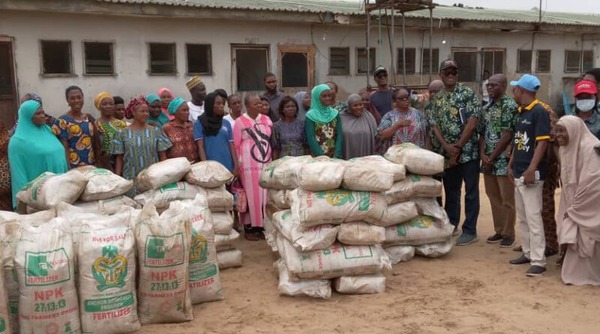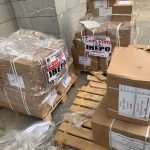The Lagos State Government has started another round of fertiliser distribution, received from the Federal Government, to clusters of farmers in the Ojo and Badagry areas of the state.
The move is designed to help in ensuring that farmers have more inputs to enhance their yield and eventually reduce price of food items across the State.
The fertilisers, distributed free of charge, were provided through the CBN Anchor Borrowers Programme.
Leading the distribution of the fertilisers to farmers in the Ojo and Badagry axis, the State Commissioner for Agriculture and Food Systems, Ms. Abisola Olusanya, said that the gesture was a deliberate attempt by the government to promote a friendly and conducive environment for farmers to address the current food crisis in the country.
She assured that the state government will sustain the distribution of fertilisers to farmers whenever the consignments are received.
Mrs Olusanya explained that officials of the Ministry had earlier carried out needs assessments of farmers across the metropolis and provided them with farm inputs based on their peculiar needs.
She noted that the intention of the Governor Babajide Sanwo-Olu-led government in providing regular support to farmers and others in the agricultural ecosystem was to ensure a reduction in the cost of produce sold to residents in various markets.
Mrs Olusanya insisted that the government wants to see the effect of various interventions on farmers to force prices down, while assuring that officers from the ministry will assist them from time to time.
According to her, the state is determined to establish more Food Hubs in the metropolis, adding that the one in Mushin has helped farmers generate more income.
Responding, the Coordinator of Nigerian Women in Agriculture Ojo Cantonment, Mrs. Oluwatoyin Oloyede, said that 70% of farmers in the farm are women.
She disclosed that the farm in Ojo Cantonment contributes more than 70% of the vegetables consumed in Lagos, adding that traders come from Oyingbo, Ikeja, Oshodi, and Iyana Ipaja to patronize them.
Mrs. Oloyede, who commended the state for the immense support, assured the judicious use of the fertilisers.
Another farmer in the area, Mohammed Kabiru, said that the open space farmland has been the choice of traders over the years for their rich supply of vegetables, cassava, and plantains.
At another farmland within the Lagos State University Ojo campus, the coordinator of the farm, Maryam Alli, described the distribution of the fertilisers as a timely and welcome development.
As an Oliver Twist, she requested easy access to vital items which were often costly to obtain. This request received a swift positive response from the commissioner.
At the Daddy Lewis farmland in the Iwodo riverine area of Badagry, the commissioner expressed happiness with the high level of irrigation, promising that the state would continue to respond to their needs.
She was also pleased with the turnover from the farmland, which was valued at millions of naira.
The chairman of Daddy Lewis farmland in Iwodo Badagry, Afeez Tiamiyu, disclosed that the farm is divided into three clusters with 75 farmers.
According to him, 500 baskets of highly nutritious tomatoes are cultivated on hectares of land and sold at a cheaper price of ₦35,000 per basket instead of ₦70,000 by others.
Highly excited residents and farmers in the area showered encomiums on the commissioner, noting that it was the first time the riverine community was recognized and supported by the government.
Some of the crops planted on the farm include tomatoes, cassava, cucumbers, vegetables, and potatoes.














